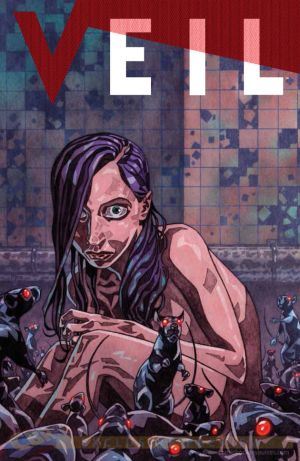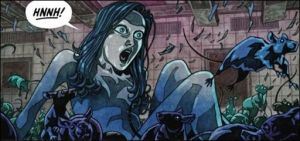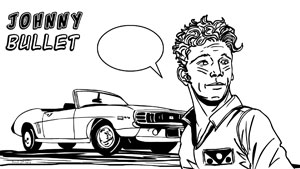|
|
 |
There's only a select few writers working in comics currently whose works are worth picking up blind. Jason Aaron, Warren Ellis, David Soule, Mark Waid, and Greg Rucka are among these few. In fact, Rucka's Lazarus should be required reading. It is that good and important a work. While Rucka's newest series Veil, is slightly different from his other recent books, it is no less intriguing. Utilizing some interesting imagery and allegory, Rucka launches his readers headfirst into a tale of mystery surrounding a young woman with superhuman powers who speaks in rhyme and seems to be an excellent judge of character. The kind man that she meets on the street who "saves" her from a potential gang rape (I put saves in quotation marks because as the issue progresses we see that it would have been her rapists who would have needed saving), whose name is Dante (and that's no random pick of a name on Rucka's part), seems to be the key to unraveling a bit of the mystery in Veil #1, albeit allegorically.
Dante is the name of the classical age poet who wrote The Divine Comedy upon which countless works of art and literature have been based. In The Inferno, Dante at one point employs the reader to "note the doctrine hidden under the veil of strange verses" (Inf. 9.61-3). Rucka's mysterious woman (named Veil) speaks in "strange verses." Rucka's smart use of a classical reference, which the reader is tipped off to through the name of one of his stories' protagonists is the kind of smart reading that we now not only expect from Rucka as readers, but relish in. I might be totally off the mark with my interpretation of Rucka's intent and use of the Dante Alighieri's classic work of literature, but the exercise in figuring out if there is any significant thematic relationship between Rucka's Veil and Dante's "veil of strange verses" was the kind of literary mental exercise I so often crave, but don't find much in comics (or prose) writing these days. I cannot wait to see what other literary allegories (possibly further culled from The Divine Comedy) Rucka will weave in subsequent issues.
Rucka is up to much more here than simply dropping smart literary hints at his story's thematics though. There is a smoldering sexual tension just under the surface that exposes itself in hellish ways. Veil is a beautiful young woman who walks out of a subway into a major metropolis' sex district stark naked stopping everyone in their tracks. Immediately she is preyed upon and looks like she might be a victim of a sexual assault. The perpetrators are stopped (temporarily) by Dante's intervention. He himself though isn't immune to Veil's powerful sexuality, although he doesn't act upon what he, perhaps correctly, interprets as an advance. The reactions of the male characters to Veil's innocent sexuality will undoubtedly be a theme that is further explored in subsequent issues.
 |
So while Lazarus will remain my favorite Rucka work to date, Veil has the potential to equal Lazarus' brilliance. I expect nothing less from Rucka and Fejzula based upon this excellent first issue of Veil.
© Copyright 2002-2025 by Toon Doctor Inc. - All rights Reserved. All other texts, images, characters and trademarks are copyright their respective owners. Use of material in this document (including reproduction, modification, distribution, electronic transmission or republication) without prior written permission is strictly prohibited.

